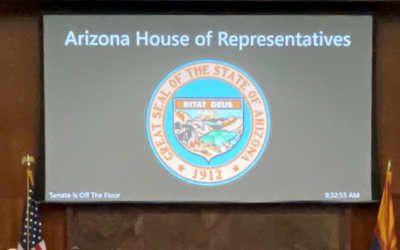By Corinne Murdock |
During oral arguments last Monday, the Supreme Court (SCOTUS) appeared to side with a Christian website designer who is challenging a Colorado law that would force her to create websites celebrating same-sex weddings. The final ruling is forthcoming.
Counsel in the case, 303 Creative LLC v. Elenis, is the Scottsdale-based Alliance Defending Freedom (ADF). At issue: whether applying a public-accommodation law to compel an artist to speak or stay silent violates the free speech clause of the First Amendment.
Attorney Kristen Waggoner argued that SCOTUS precedent rejects government-compelled speech like what the state of Colorado wants to impose on graphic artist and website designer Lorie Smith with the threat of “pain of investigation, fine, and reeducation.”
Colorado Solicitor General Eric Olson argued that the free speech clause exemption wouldn’t just apply to sincerely held religious beliefs, but “all sorts of racist, sexist, and bigoted views.” Olson claimed that such protections would allow a tech company to refuse to serve 303 Creative LLC because of Smith’s religious beliefs.
Near the end of arguments, U.S. Deputy Solicitor General Brian Fletcher stated that he wanted the Court to find religious business owner discrimination against same-sex unions to be as odious and invalid of First Amendment protections as racism.
“I don’t mean to equate those who have different views of marriage to racists, but the reason why I rely on those hypotheticals is because this court’s First Amendment jurisprudence does not distinguish between views we find odious and those we respect,” stated Fletcher. “The same principles apply in both places, and if the principles lead to unacceptable places when we consider them in light of odious views, then I think we have to reject those principles even in the case where we sympathize with and respect the views.”
The three liberal justices of the court — Elena Kagan, Ketanji Brown Jackson, and Sonia Sotomayor — argued that website designers don’t speak through their product. They also argued that extending protection to speech arising from religious beliefs of true marriage would lead to protections for speech arising from discrimination against interracial or disabled couples.
The six conservative justices — Samuel Alito, Clarence Thomas, Neil Gorsuch, Amy Coney Barrett, Brett Kavanaugh, and John Roberts — repeatedly revisited the distinction between personalized, custom, commissioned products and goods and services served generally to the public.
Kagan claimed that websites weren’t particularly ideological or religious if there was an absence of explicitly written scripture or ideology. Waggoner disagreed, pointing to the context and message of the speech.
“When you switch out those names, you’re switching out the concept and the message that is in this website,” stated Waggoner. “The same words can convey different meanings.”
Sotomayor insisted that a creator wasn’t issuing speech by merely creating a product like a wedding invitation, but that only the distributor of the invitation was engaging in speech. Sotomayor further indicated that Smith’s work could only be viewed as her speech if she had stated expressly on her business website that her creations constituted her speech. Waggoner disagreed.
“In the same way that is the ghostwriter who writes an anonymous press release or a book. It is still that writer’s speech,” said Waggoner. “I don’t understand. How is this [the creator’s] story? It’s their story. […] It’s the story of the couple.”
Sotomayor questioned if there was a limit to compelling speech, citing examples of marriages between interracial couples or disabled persons. Waggoner said that was different, saying that it was “highly unlikely” that creators would serve certain races of people in certain contexts but not in a marriage.
“You’re not basing it on the nature of the message, you’re basing it on who you’re serving,” argued Sotomayor.
Waggoner contended that Smith has LGBTQ clients for other products, but can’t support same-sex marriage due to her Christian beliefs.
Sotomayor conflated Biblical and non-Biblical issues repeatedly, such as race and ability, insisting that creating content to display representation of a homosexual couple’s relationship wasn’t compelled speech. She compared Smith’s refusal to create a same-sex wedding website to a restaurant owner offering a limited menu to black individuals.
Waggoner said that book authors, newspaper editors, and writers for other types of publications were issuing their speech. Jackson interjected to say that those publication types weren’t “public accommodations in the same way.”
Jackson asked whether a caterer providing food to only Protestant customers would enjoy the same speech protections. She argued that conduct equated speech. Waggoner said no, drawing a distinction between speech and the messaging conveyed through conduct.
Alito questioned whether “plug and play” websites, essentially templates, imposed the same compelled speech issue. Waggoner said that was not the case because a creator wouldn’t be creating speech for the couple.
Barrett asked several hypotheticals: whether Smith would publish a site for a couple who describe their sexuality in a Biblically ambiguous way — “cisgender” and “heterosexual” — or a couple who admitted that they were marrying after cheating on their respective spouses. Waggoner said that Smith wouldn’t.
Waggoner argued that the court offers broad protections for speech arising from personal convictions.
“I think what’s important is the message she’s being asked to create,” stated Waggoner. “She believes that same-sex weddings contradict Scripture. And she’s announcing a concept of marriage that she believes to be false.”
Barrett asked why Smith couldn’t give a homosexual couple a website that was already created for a heterosexual couple. Waggoner said that it wouldn’t be the “same” since Smith would have to incorporate details and photos of the same-sex couple into the site.
“We know context changes meaning, just as Ginsburg said in Yates v. United States,” stated Waggoner.
Barrett asked whether the same could be said of a songwriter licensing an already-published song to a same-sex wedding. Waggoner said that the artist couldn’t because it was already in the stream of commerce, but admitted unfamiliarity with licensing procedures. She clarified that it would be different if the artist were to sing the song at or for the wedding.
Jackson argued that there’s no precedent for this type of case; Olson concurred. Thomas asked Olson to summarize any tradition of public accommodation laws, cases, or common law tradition applying to speech.
“The complicating factor here is this is not a hotel or a restaurant or a riverboat or a train. I’m interested in the intersection of public accommodations law and speech,” said Thomas.
Olson claimed that public accommodation laws don’t carve out exceptions for speech. He said there wasn’t a history of cases in which people asked for these exceptions.
Olson affirmed Sotomayor’s assertion that Smith’s business would be the first public accommodation that could refuse to serve a customer based on race, sex, religion, or sexual orientation.
Kagan asked whether Colorado would allow Smith to refuse a same-sex couple’s request to quote Obergefell v. Hodges on their website: the SCOTUS case requiring states to recognize same-sex marriage. Olson said yes, since she would be denying that request for all customers. Then Kagan asked whether Colorado would allow Smith to refuse a same-sex couple’s request to put “God blesses this union” on their website. Olson said that was different because it implicates free exercise of religion concerns.
“It is a statement of opinion about the nature of this marriage,” said Kagan.
Roberts asked why an individualized, subjective, multi-factor determination in foster care and adoption wouldn’t be the same as a seat on a bus or room in a hotel. Olson said that since Smith engages with customers as a public accommodation, she needs to be held to that discrimination-free standard. Olson characterized Smith’s religious dissent as a “status-based discrimination.”
Olson said that Smith’s business would suffer because she would lose opposite-sex couples upset by her refusal to serve same-sex unions. Alito questioned if businesses were allowed to exercise any kind of selectivity; Olson responded that Alito’s hypothetical required a fact-based analysis.
Alito asked further if selectivity conferred a public service status to businesses. Olson affirmed on the stipulation that selectivity was the only factor in their decision-making, noting that selectivity based on protected characteristics like race or sexual orientation wasn’t allowable.
“The more selective and curated the process is, the less likely it is to be a public accommodation,” stated Olson.
Alito asked whether Jewish photographers could be compelled to photograph for customers using the pictures on the website facilitating affairs, Ashley Madison, which prompted laughter. Olson said they could.
“The website designer can choose to put on their websites whatever they want,” said Olson. “But they just can’t refuse to sell — if they’re a public accommodation — they can’t refuse to sell that website to someone solely because of the customer or couple’s religion.”
Alito then asked if it was fair to equate opposition to same-sex marriage with interracial marriage. Olson responded affirmatively.
“Of course honorable people have different views on this issue,” said Olson. “The way to honor that requirement is as this court has set forth in Fulton, in Masterpiece, is to have a rigorous interrogation to make sure that there are neutral and generally-applicable laws applied in fact that way that don’t single out religion.”
Alito then asked if writers could be forced to write customized wedding vows or speeches containing speech that they loathe. Olson said no, because the speech wouldn’t contain offenses against protected classes. He said that “things that people loathe” wasn’t protected like sex, gender, religion, or discrimination.
Gorsuch asserted that Smith’s customized and personalized products were different from offering general services. Olson argued that allowing Smith that freedom of creation would result in every single same-sex couple being turned away, but Gorsuch disagreed.
“Well, they can ask for what they want but what they get might be another thing,” responded Gorsuch.
Gorsuch asked if speechwriters would be held to the same standard as Smith. Olson said Colorado wouldn’t compel that speechwriter to produce work to which they object.
“You can choose the content of what you say, you just can’t choose who you sell to,” stated Olson.
Gorsuch challenged why a speechwriter would be any different from Smith’s company. Olson claimed that Smith wouldn’t sell a wedding site promoting homosexual unions to same-sex couples, but Gorsuch contended that Smith was refusing to sell sites promoting that content to any customer.
Corinne Murdock is a reporter for AZ Free News. Follow her latest on Twitter, or email tips to corinne@azfreenews.com.








